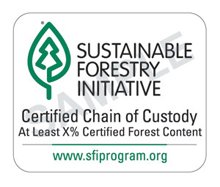
PORTLAND, OR – ForestEthics today announced a new example of a growing trend of corporations avoiding the use of the logging industry’s ‘Sustainable Forestry Initiative’ (SFI) label, which is governed and financed by some of the biggest names in logging. To date, twenty-five prominent brands including AT&T, United Stationers, Pitney Bowes and Allstate have now taken action to move away from SFI.
Stash Tea will avoid the promotion of the Sustainable

Forestry Initiative (SFI) and disassociate itself from the SFI by removing the SFI logo from its packaging and all SFI-certified content from its supply chain.
“ForestEthics congratulates Stash Tea for recognizing that the misleading SFI label is not good for forests, or Stash Tea’s brand,” said Jim Ace, Senior Campaigner at ForestEthics. “Stash Tea is a classic case of the fox guarding the henhouse, and that type of greenwash is not in line with Stash’s promise of environmental responsibility.”
Controversy around SFI centers on the following:
- SFI was founded and continues to be governed by the timber industry;
- Virtually all of SFI's funding comes from the companies or investment groups that own or manage the 160 million acres of land in North America that the SFI certifies.
- SFI approves forestry practices that wreak environmental harm, including logging that creates massive erosion and landslides, destroys wildlife and fish habitat, pollutes streams and rivers, and contaminates communities with toxic herbicides.
Portland-area environmental organizations were pleased with the announcement:
“SFI misleads consumers and hurts forests and wildlife," said Brian Pasko, Director of the Oregon Sierra Club. “We appreciate Stash Tea for rejecting the SFI program—and look forward to seeing Stash Tea boxes without the SFI logo.”
“Forests are critical to the survival of many endangered animals,” said Noah Greenwald, Portland- based endangered species director for the Center for Biological Diversity. “Here in the Northwest, old-growth forests provide essential habitat for our Pacific salmon stocks, spotted owls and marbled murrelets and many more, as well as storing massive amounts of carbon, moderating the impacts of climate change. It is in this context that Stash Tea must be commended for their decision to stop promoting and using the logging industry’s misleading eco-label, SFI.”
"SFI-certified logging pollutes streams - affecting drinking water suppliers and salmon habitat,” said Marlies Wierenga, Portland-based Pacific Northwest Conservation Manager of Wild Earth Guardians. “We congratulate Stash Tea for connecting the dots and rejecting misleading eco- labeling."
"The so-called Sustainable Forestry Initiative (SFI) is a classic example of false advertising that misleads both businesses and consumers,” said Dr. Amy Moas, Greenpeace Senior Forest Campaigner. “Companies that use a lot of pulp and paper for things like packaging need to keep a close eye on their supply chains to make sure they’re not complicit in forest destruction. Greenpeace applauds Stash Tea for doing just that, and cutting its ties with SFI.”
“SFI greenwashed paper and packaging threatens our forests,” said Francis Eatherington, Conservation Director of Cascadia Wildlands. “We applaud Stash Tea’s decision to reject the SFI program—and we will be watching with interest as Stash changes its packaging to implement its new policy. I enjoy Stash tea, and now I will enjoy it even more!”
ForestEthics’ ongoing campaign to expose the SFI’s certification program in the U.S. marketplace began in 2009.
ForestEthics has publicly confirmed action by 25 major US brands to reduce SFI’s role in corporate environmental programs. For more information, see
http://forestethics.org/sustainable-forestry- initiative
Source: ForestEthics
 PORTLAND, OR – ForestEthics today announced a new example of a growing trend of corporations avoiding the use of the logging industry’s ‘Sustainable Forestry Initiative’ (SFI) label, which is governed and financed by some of the biggest names in logging. To date, twenty-five prominent brands including AT&T, United Stationers, Pitney Bowes and Allstate have now taken action to move away from SFI.
Stash Tea will avoid the promotion of the Sustainable
PORTLAND, OR – ForestEthics today announced a new example of a growing trend of corporations avoiding the use of the logging industry’s ‘Sustainable Forestry Initiative’ (SFI) label, which is governed and financed by some of the biggest names in logging. To date, twenty-five prominent brands including AT&T, United Stationers, Pitney Bowes and Allstate have now taken action to move away from SFI.
Stash Tea will avoid the promotion of the Sustainable  Forestry Initiative (SFI) and disassociate itself from the SFI by removing the SFI logo from its packaging and all SFI-certified content from its supply chain.
“ForestEthics congratulates Stash Tea for recognizing that the misleading SFI label is not good for forests, or Stash Tea’s brand,” said Jim Ace, Senior Campaigner at ForestEthics. “Stash Tea is a classic case of the fox guarding the henhouse, and that type of greenwash is not in line with Stash’s promise of environmental responsibility.”
Controversy around SFI centers on the following:
Forestry Initiative (SFI) and disassociate itself from the SFI by removing the SFI logo from its packaging and all SFI-certified content from its supply chain.
“ForestEthics congratulates Stash Tea for recognizing that the misleading SFI label is not good for forests, or Stash Tea’s brand,” said Jim Ace, Senior Campaigner at ForestEthics. “Stash Tea is a classic case of the fox guarding the henhouse, and that type of greenwash is not in line with Stash’s promise of environmental responsibility.”
Controversy around SFI centers on the following:
